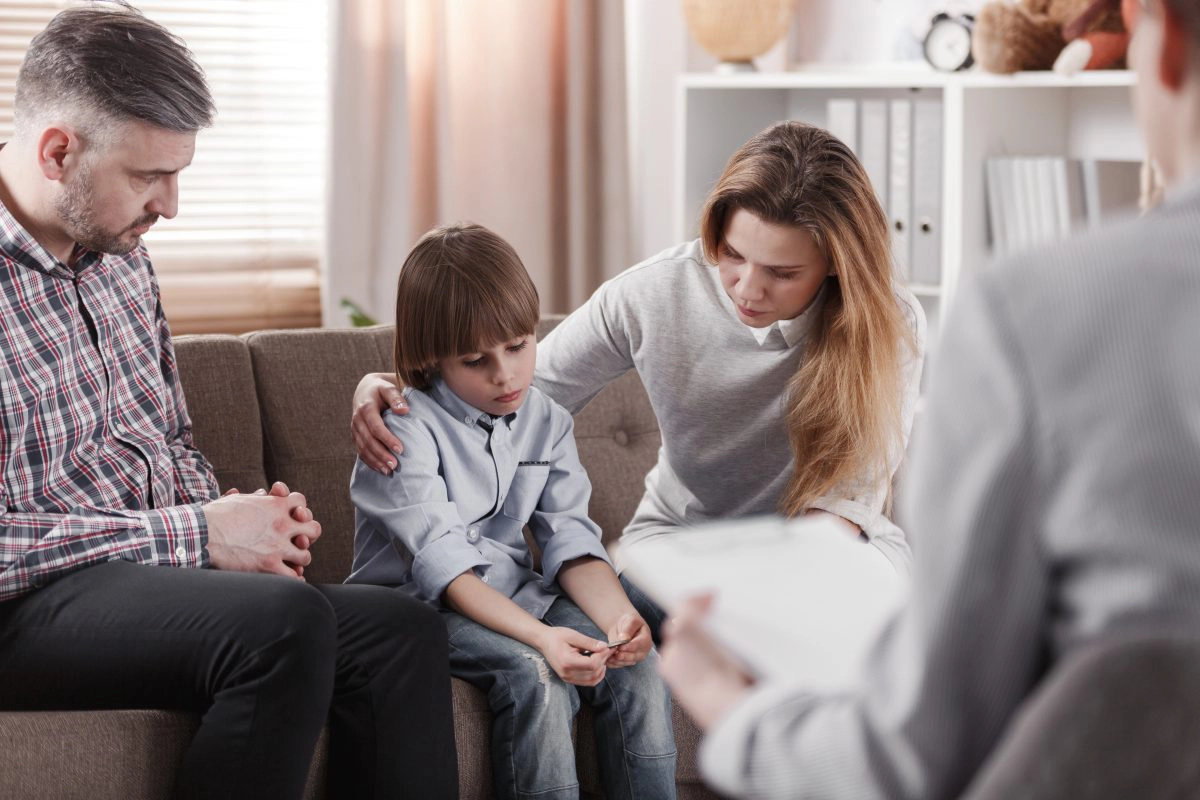Family therapy is among the treatment options for people who suffer from addiction. It does not only involve the individual but includes their family as well. It provides an opportunity for everyone affected by the addiction to express themselves. Doing so, communication lines can be opened again and the healing process can begin.
If you’re curious to know about family therapy and how it works for addiction treatment, read along, and you’ll find most of the information that you need. Let’s begin by knowing more about what family therapy is.
What is Family Therapy?
Family therapy is a type of psychotherapy that involves not just the person concerned but his or her loved ones as well. It is a type of treatment that focuses on treating mental health problems, emotional problems, and other psychological conditions.
There are many kinds of therapies, and family therapy is one of them. This type of psychotherapy allows individuals and their families to look deeper into the problems, conflicts, and how to reduce distress. They get to learn healthier ways to deal with the issues.
One of the primary goals of family therapy is to help improve the relationship with family members. It could include your partner, children, and other related members. In this type of treatment, you may address your problems, may it be small or big, like an addiction. Also, you can specify some of your pressing issues, such as financial troubles, marital issues, a conflict among family members, or substance abuse.
If you need family therapy, your family may pursue this along with the other types of treatment. This therapy is essential, especially if the person has a mental illness or substance addiction. It is because some of these illnesses require additional treatment. If one of your family members has an addiction, the family can attend the therapy while the patient is in a rehab program.
Types of Family Therapies
Family therapy may be a long and challenging process, but it can be beneficial. There are different types of family therapy. Knowing these types will make it easier for you to determine which one you think will best suit your case. You can also discuss this with the therapist and see what he or she has to say about it. Here’s a list of the different types of family therapy to help you with your situation.
Structural Counselling
This type of counselling focuses on the family system. It records the roles and power distributed among the family members. It also addresses issues in the hierarchy to make sure the parents or the adults are in control of the situation.
Another case is to make sure that they are setting the right boundaries for the children. In this way, the aim is to strengthen the relationship of the family. The therapist also makes sure that no one in the family system has too much power. It is because having someone dominate the other can disrupt the relationship with the other members.
Strategic Counselling
Strategic counselling is a brief but direct family therapy approach. It applies to those who want results in a shorter period. The therapists in this approach give homework to family members. It is to help them change the way they interact with the person who is having a problem like an addiction.
The therapist assesses coalitions, hierarchies, and communication systems similar to other types of counselling approaches. There are standard techniques used in strategic counselling. When a family therapist notices that one of the family members dominates and controls the interactions of the family, he or she takes over authority. It is in this way that the therapist can shift patterns of communication for the family’s issues to get better.
Bowenian Counselling
This type of therapy works better for those who cannot or don’t want to go into a therapy room. The Bowenian approach has two core concepts, differentiation, and triangulation. Differentiation focuses on learning to become less emotionally reactive. The strategies used in this approach involve letter writing.
On the other hand, the triangulation approach involves the natural tendency of having a third party to divert anxiety or conflict. One example of this is that when a mother complains to her daughter about the problem with her husband.
Benefits of Counselling

Family therapy can be helpful in any situation that a family may face. Typically, a family may encounter stressful events in their life like a sudden death of loved ones, family relationships, divorce, financial problems, and more.
- Communication – It is the most important thing that a family should have in their home. With the help of a family therapist, each family member is taken together as a group to develop a unified family objective and find solutions to the issues and problems they face. Also, with the knowledge and exercises given by the therapist, they will communicate in better ways without shouting and arguing.
- Relationship – Family therapy helps the family to work together. He or she contributes to rebuilding the bond of each family member and generates accountability. Moreover, therapy encourages families to talk to the therapist when they are committed to change and understand their roles. A therapist will be the one to help a family identify the strengths and weaknesses of the household scheme to create a system that will help them grow as a group.
- Acceptance – Being accepted in a family is a great feeling. One benefit of family therapy is being recognized while the therapist listens to you as a group. Without any judgment, you can share and open up all your thoughts, not just an individual, but as a family member.
The primary intent of family therapy is to improve the relationship. It doesn’t automatically solve the problems within the family in one session and get over all the issues. Having addictions, mental problems and breakdowns won’t easily be treated. But family therapy can help in understanding one another for the better.
The average number of sessions for therapy is 5 to 20 sessions, depending on the situation and problem of the family. It also administers skills to cope up with the conflicts, and it can help to bring unity to a family.
How Does Family Therapy Work for Addiction Treatment
Addiction has been a broad psychiatric disorder that expands from alcohol and drugs to gambling, hoarding and even eating. It starts from a simple gesture that turns into habits until it becomes an addiction. Unlike many other disorders, the patient may acknowledge the presence of signs and symptoms but fail to avoid them since they have been conditioned to do these repetitive actions.
Addiction is manifested by compulsive tendency to do such act or take a particular substance. Alcoholism and drug addiction are the most common form of this since the substances are widely accessible to individuals who are stressed. These stress roots from lack of attention, marital issues, financial problems, and lack of self-discipline. The patients often have a hard time bringing the issues on the table, only dealing with the problem passively.
Consulting a Physician for Family Therapy
Most patients reflect on the signs and symptoms of addiction are unable to stop even if they want. They find it hard to consult a physician because they may think that it is a waste of money and time until the addiction becomes unbearable. Various medical treatments are available, like getting an alcohol addiction treatment or smoking cessation and rehabilitation.
Family, as a class of a social group, plays a crucial role in helping any family member who is struggling. It can lead to the reduction of unhelpful behaviours and an increase in motivation and healing. In the context of addiction, the immediate family who deals with the patient might have adapted negative actions, emotions, and stress. To address the issues, family therapy is recommended to treat the family in conjunction with their addicted loved one.
Family therapy is part of a method of psychotherapy. It does involve not only the individual but also the family members. As the saying goes, a healthy environment produces healthy well-being. The main goal is to repair the relationship, bring clarity to past issues, and restore the family’s closeness. Family therapy looks simple on the surface, yet it digs deep between the individuals involved.
In the context of addiction, it can also be considered as a family disease. With no proper family intervention, it might lead to the development of emotional triggers and the patient might struggle to cope. With family therapy, each individual will understand more about the disease and can show support to their loved one. By pursuing family healing, the patient will not stray from recovery and will not be afraid of long term rehabilitation.
Impacts of Drug or Alcohol Addiction on Families
There are different ways drug or alcohol addiction can impact a family, depending on the structure. Drug or alcohol addiction can damage the life and body of an individual on the grip of addiction. Families also face the same problems due to feeling neglected, ashamed, and angry towards that member who’s struggling with addiction.
Aside from the negative emotions, one of the significant impacts of drug or alcohol addiction on families is the safety of the rest of the family members, specifically the children. Children are the most vulnerable ones here. They are at risk of drug or alcohol addiction as well because of the possibility of mental health disorders, such as anxiety or depression, that may arise.
Another negative impact of drug or alcohol addiction is that it forms a barrier to prevent communication. The positive interaction between the addict and the family members will lessen, which can create stronger negative emotions such as anger and hatred towards the member who’s a drug or alcohol addict.
Addiction can negatively affect family relationships. Drug or alcohol addiction can damage relationships that can result in integrating negative behavioural modelling between the addict and the family members for a long time.
As a result, the addict has a higher chance of isolating themselves from the other members of the family. It is because of the feeling of being neglected. Consequently, the feeling of being neglected from the family can lead the addict to spend most if not all of their time with other drug or alcohol addicts.
How Does Family Therapy Work for Addiction Treatment?

The engagement of family is essential since it helps the patient to enhance his or her relationship with the other members. It can also help when it comes to dealing with anxiety, anger, frustration or resentment. These emotions contribute to the triggers of addiction.
The family members will also benefit through the reconstruction of family gaps made before the addiction occurred. This program of family therapy strengthens the family support system and helps set a new boundary to help the patient with addiction.
This type of program includes family sessions that will educate the family members about the destructive effects of addiction. There will also be individual counselling on how the family members should approach the recovering patients. Many more activities that will break the barriers will be employed.
Patient and family counselling is the core of the program. The hope is to understand the individual roles each member is playing. It is essential to the recovery of the individual with addiction problems. The family also will be assisted in ending the destructive cycle of codependency.
So, if your loved ones show any signs of addiction, it is crucial not to scorn and yell at them. Advise them to consult a physician and support them on their way out of the addiction. Respond to any treatment and family therapy needed. Family therapy isn’t always easy, but it will be worth it. Always be supportive because family therapy will help everyone involved.
Making family therapy work for addiction treatment can be challenging and difficult at first, but it’s not impossible. The drug or alcohol addict must open up to their family members with the help of therapists. It will help in forming an even stronger relationship and more transparent communication among family members. Keep in mind that family therapies can only work if both sides of the party are willing to change and improve their ways.
What are the Benefits of Family Therapy for Recovering Addicts?
Family therapy is used by therapists and psychologists to help recovering addicts go through the process of addiction recovery. The use of family therapy as a treatment for addiction has been useful for both adults and teenagers. A person who wants to recover from addiction will have a hard time going through the process of recovery without supportive friends, family, or loved ones.
Family therapy is a psychological approach to confronting conflicts and miscommunication within all the family members. Family therapy uses all of the family’s strengths to assist the family member with an addiction to live a life that is drug-free and alcohol-free. Other issues within the family are addressed in the sessions, as well.
Therapeutic interventions of a family have other benefits, such as discussing roles in the family. The family can learn what actions can aid or what can harm. Identifying approaches to communicate and respecting the needs of everyone are also part of the things that the family can learn from the sessions.
Understanding Addiction And How It Affects Behavior
Having a better understanding of addiction and how it is affecting the behaviours of an individual is established with education. Just as the individual who got addicted needs to understand themselves more, the family members have the chance to fully assess the situation and gain more wisdom from the therapist. In doing so, the family is finally a step closer to a better life without the problems of addiction.
Re-Establishing Trust
When an individual is secretly addicted to a substance, know that dishonesty comes in to play. The addicted family member may never admit to their mistakes because they are too afraid of what other family members might think. If you feel that your family will never understand, remember that they are still your family. They are always ready to open their hearts and try to support you in your recovery. They are also willing to help you fight your addiction and make your life whole again.
Knowing The Boundaries
Knowing the boundaries is an applied rule for every family member. Although establishing boundaries within the family is not an effortless task, it is a necessary action for the family to recover from addiction. However, sometimes detaching the family from a member that has an active addiction would benefit the addict and the family to improve independently. Family members may try to help the addicted individual but end up doing more harm than good. With family therapy, the members of the family can learn about how to best address the situation.
Improvements In Communication
When an individual is addicted to a substance, one of the side effects is the urge to isolate themselves. When someone is separated, communications will become limited. As they don’t want to get involved with anybody else even if it’s their family. Improving communication is the key to their recovery and will require the family to invest time and effort in their rehabilitation.
Sharing What Are You Feeling Inside
Connections between the family can shatter when an individual is actively an addict. Mixed emotions felt within the family involves anger, distrust, and discouragement. However, if the family takes their time to assess the situation, they will learn how to perceive and adjust their emotions for the benefit of the one addicted. Nevertheless, it is still important to express oneself because addiction affects the whole family and not just the individual. Sharing what you feel will allow the family to take care of each of the members.
Learning To Care For Yourself
Although the path to recovery in family therapies involve all of the members working together, the main focus should still be on the person who is addicted. During a family therapy session, it may be revealed that there’s a parent, spouse, or a member of the family who may also be struggling with their problems. While it is vital to care for the individual with an addiction, it is still essential to take care of oneself. It is in this way that each member can better support the addicted family member.
How Does Family Therapy Work

Having an addict within the family can cause misfortunes for the rest of the family members. Family therapy is a session between the therapist and the substance user, which typically involves other vital people in the addict’s life. It could be a member of the family, a spouse, the addict’s significant other, or even an individual who has a close relationship with the addict.
Establishing Goals
The first part of family therapy is determining the goals that the family wants to achieve. Having goals can help improve communication among family members. When the treatment starts, each family member is going to determine, on the spot, how much are they willing to continue working on the problem. For example, how committed are they in helping their loved one with an addiction? Addressing how to improve difficulties at home and their personal life is another goal.
Setting The Mood
Family therapy can happen anywhere as long as it is a comfortable environment for both the patient, the family, and the therapist. Therapists can hold their sessions in a treatment center, their office, or a place where the patient is comfortable like their home. Therapy sessions usually last for three hours because they don’t want patients to be overwhelmed.
People Who Take Part In The Activity
Whether if its a family therapy or personal therapy, any person who is considered to be essential in the session shall join the treatment. Having another party in the procedure could give a more efficient result when it comes to the recovery of a substance addict. It may even help the family recover from the damage addiction presents.
Experts are still trying to improve family therapy when it comes to dealing with addiction or even confronting the problems in the family as a whole. With the use of family therapy, substance abusers can be treated together with the family that was affected by the drawbacks of it. Minimizing harmful behaviours is just one of the approaches for addicts.
There are advancements to family therapies that can be helpful for numerous problems for adolescents and adults alike. These problems are disorderly conduct, schizophrenia, and substance abuse. In doing so, it can lead to better relationships, reducing domestic violence, and re-establishing connections within the family.
What to Expect During Family Therapy for Addiction?
Getting help for treating an addiction to substance abuse is what counselling or psychotherapy is all about. However, what makes family therapy different from your regular counselling or psychotherapy is that members of the family will be part of the therapy sessions.
Family therapy for addiction can be challenging for the individual who’s an addict on illicit drugs or alcohol because these problems are personal. One of the significant consequences for addiction is that people close to you will cut off their relationship with you.
Family therapy focuses on addressing the addiction and its effects on the whole family. It is essential to hear the thoughts and opinions of the family members. Drug or alcohol addiction is a severe case. Individuals with drug or alcohol addiction aren’t the only people who are suffering but also their loved ones.
The family of individuals who are having problems with addiction will often feel ashamed, angry, and neglected. They will feel like they’re one of the reasons why the particular individual became addicted to drugs or alcohol. One of the significant issues that can arise from family members in this situation is that they’ll have problems emotionally and cognitively.
Goals of Family Therapy
The main objective of family therapy is for the family to be assisted in understanding how addiction can significantly impact them. Also, they’ll go through specific techniques and practices as well as be taught skills to strengthen their relationship as a family.
An individual might have turned into a drug or alcohol abuse is because of the conflicts at home or with particular family members. Family therapy can open the eyes of family members to inform them of the risk factors that can turn someone into an addict. Finding effective ways to help prevent those risk factors from happening is also essential.
Responsibility of the Family
Keep in mind that if you’re a father or a mother who’s a drug or alcohol addict, your children can have a higher risk of mental health disorders such as depression or anxiety. Since the common struggle for adults has extremely low-self esteem, they’re more prone to alcoholism, domestic violence, and financial troubles.
Everything starts at home and that keeping a healthy family mentally, physically, and cognitively will take a lot of time, patience, and effort. Given that there are certain factors to maintain a healthy family, there are additional factors to consider when the entire family is dealing with the addiction of a particular family member.
Family therapy will help the family understand the factors that contribute to behaviours that can ultimately cause addiction. Also, family therapy will prevent destroying the barriers to communication, help the family members interact with each other positively as well as overcome the struggles to change.
The other essential task of therapists who specialize in family therapy is to make sure that every member of the family, especially teenagers and children are away from harm as well as to prevent being neglected.
Related article: Family Therapy: Is It Important for Addiction Treatment?
Forms of Family Therapy Sessions

Family therapy sessions can have different approaches and ways that’ll help tackle the problems of families dealing with addiction. Here are some types of therapy sessions.
- Group sessions with a drug or alcohol addict and their loved ones
- Intensive family education sessions, such as activities or family weekends
- Individual counselling for the children or spouses of an individual recovering from addiction
- Private Family Therapy Sessions for one or more family members under the guidance of a therapist
Different forms of therapy sessions exist because not all recovering drug or alcohol addicts go through the same problems or have the same situation in life.
Different Therapeutic Strategies You Might Encounter
Therapists also use different therapeutic strategies to make sure that different types of families go through effective family addiction treatment. Here are some of the most effective therapeutic approach.
Behavioural Family Therapy
The behavioural family therapy incorporates Cognitive Behavioural Therapy or CBT principles to help identify the family’s destructive thought behaviours and patterns. The therapist will help each of the members of the family to replace those harmful thoughts, behaviours, and patterns with positive actions integrating soberness.
Multidimensional Family Therapy
Multidimensional family therapy is the most effective therapeutic strategy for teenagers recovering from drug or alcohol addiction. This therapeutic strategy aims to build strong and stable identities for adolescents and children.
Following this, the therapist will help parents of the teen build a healthy parent-child relationship through proper communication and setting limits.
Strategic or Structural Therapy
The strategic or structural therapy concentrates on identifying and changing the fundamental factors that stimulate addiction. Therapists focus on helping the addict’s family members by setting boundaries as well as stressing on improving their communication.
What Family Therapy Hopes to Achieve
Overcoming the obstacles that hinder an addict from effectively recovering from drug or alcohol addiction is one of the first goals of family therapy for addiction. However, sober family members may also not admit that they’re one of the major contributing factors that resulted in the behaviour of an addict.
Further, one of the most apparent feelings an addict can receive from participating in family therapy is that they might feel criticized, judged, or scrutinized. However, therapists aim to approach these situations appropriately to address such feelings.
Maintaining emotional control in parents as well as the children of parents in the grip of addiction to help them get on the right path as well as to have an effective recovery process. Family therapy is vital for those recovering from addiction because it’s not only the addict that faces problems but also the entire family.
Family members need to keep in mind of their actions and the way they communicate with each other to prevent issues such as rebellion, alcoholism, and even domestic violence. The way we interact and communicate with each other can all lead to different factors that can influence us to abuse drugs and even alcohol. Through family therapy, everyone in the family can become more self-aware of what they say and what they do.
How to Prepare for Family Therapy Sessions?
We all have our problems when it comes to our family. Some small quarrels may erupt into massive problems that ruin relationships. With family therapy, there is a chance to resolve conflicts by improving communication with one another. With the help of a therapist, the family can learn how they can better deal with the issues that they are facing as a family.
Family therapy is designed to treat any issues that affect the entire family. It addresses the concern of each member so that they may be able to solve their problems. Doing so will lessen the chances of conflicts arising. This therapy also helps mend and improve the relationship among the family members.
Family therapy is a form of exercise and technique that stems from behaviour therapy, cognitive therapy, and other types of treatments. The method and solution may depend on the situation and problem of each family. The procedure may be long or short term. It depends on the situation and the case of the family, as well as what the issues and goals are.
To prepare for the sessions, you need to ask for a recommendation from your doctor for a therapist specializing in family therapy. You need to make sure if the therapist is a good fit for your needs. Here are some guidelines if the therapist is fit for your family.
Experience and Education

These two are essential requirements for a therapist. You must know the educational background of the therapist as well as the experience in handling family therapy. You can also ask if he or she has specialized training for treating your particular case.
Length of Sessions
You need to ask how long would it take to finish one session. How many days per week for the scheduled therapy session is going to be required? After the assessment, you can also take note of how long should you expect the therapy to last. Is it going to be several months or a year? These details are something that you and your family should consider.
Location and Availability
It is vital to know the availability of a therapist. You need to consider if the therapist is available for an emergency. You must find the location, and you must choose the nearest therapist as you can ask immediate support in case of an emergency.
Insurance and Fees
You must know your budget well since you need to finish the whole session for family therapy. You cannot quit in the middle of a session. Insurance covered by your health plan must be stipulated in your contract. You must know what your financial responsibilities are so that the family can decide as a group as to how the finances for the family therapy ought to be managed.
What to Expect from Family Therapy
You must think about what are the benefits you can get for family therapy. You need to prepare the whole family and act as one to fully utilize the therapy sessions. You must think if this session is for long-term or short-term goals. Do you want to fix your anxiety or to maintain communication within the family? Do you expect to solve the problem within your family situation for just a few sessions? You must think first on what to expect from the therapy, and what you will gain from all the sessions you will have with your therapist.
Family therapy is a therapy session that involves most or all family members. If a family member is not comfortable with a family session, those family members can focus on individual therapy to cope up with his or her problem. During the family session, the therapist will assess your family situation to make a proper procedure per session. It will include the thoughts, behaviours, and emotions of every member.
The therapist will consider the roles and behaviour of each member to identify the situation within the family. It may include the work status as well as the relationship with each member. The decision-making capabilities of each member and how they handle their emotions may be included, as well.
Ask If The Therapist Can Do Indirect Counselling
If you’re not comfortable with direct counselling, you need to ask the therapist if he can do indirect counselling therapy before starting your session. If you or your member of the family is not comfortable with face to face counselling, a different approach will be applied.
Some of the family members might be against the decision of having a family therapy session. One of the solutions for this problem is providing this family member to have his therapist, whether it is direct or indirect counselling, depending on the situation. Family therapy can help you solve a certain degree of a problem. It takes time to resolve a family conflict or issue. All members of the family must cooperate, especially if addiction is ruining the family.
Other Therapy Options for Treating Addiction
People will typically unknowingly cheat on themselves and prefer to refrain from their drug or drink of choice without acting on the core problems that cause them to do drugs and alcohol. What these people don’t understand is that recovery from substance or alcohol dependence is much more than merely stopping.
Addiction begins from within, and even when you go through physical detox, you will still feel the subconscious desires and triggers that kept you drinking or using. Without recognizing what those problems are, and taking strides toward correcting them, you will hardly place yourself in a vulnerable spot in which you are still capable of repeating the same mistakes you made over and over again.
On the other hand, by seeking help from support groups or facilities, you will increase your chances of escaping the chains of addiction, and make an early recovery.
Multidimensional Family Therapy (MDFT)
MDFT is a program particularly beneficial for the teenager or young adult community suffering from substance abuse. Multidimensional Family Therapy focuses its interest in understanding each of the many present influences that lead to substance abuse.
These influences include:
- Community influence
- Peer influence
- Educational influence
- Individual influence
- Family influence
Once established, Multidimensional Family Therapy acts to address and change each one individually, as no solution will be suitable for each setting. In Multidimensional Family Therapy, sessions include the therapist and patient, the parent and therapist, and then the whole family and the therapist.
During the patient sessions, the therapist will act to:
- Enhance socialization skills to obtain a mutually helpful understanding with teachers, parents, and friends
- Promote improved decision-making abilities in the patient that will result in a decreased probability of irrational, impulsive choices
- Develop vocational skills to obtain a sense of direction and focus on the future.
- Improve overall communication and self-monitoring skills, reinforcing particular insight and enlightenment to others concerning thoughts, behaviours, and feelings
- Improve problem-solving abilities to create a wide array of possible answers to a question or circumstance rather than thinking about a few possible choices
Motivational Interviewing

This approach is a modern style of person-centred therapy intended for addiction. The objective of motivational interviewing is to make the patients find their desire and drive to formulate suitable options rather than force them into it by threats of guilt or legal recourse.
A motivational interview operates to achieve this goal through:
- Autonomy. The patient has the obligations for himself and the capability to make his or her decisions.
- Collaboration. The therapist acts to share the thoughts of the patient rather than confront them.
- Evocation. This method is the creation of transformation from within the patient with the intention of more solid engagement and more sustained consistency with practice.
The task of the therapist is to construct the will to change within the patient. This task includes managing patient resistance, being empathic, and showing the contrasts between what the patient desires and what they are going to perform to attain it. If someone aspires to live a joyful life, the therapist may ask if regular heroin use supports or gives a barrier to this goal.
Motivational interviewing has been instrumental in many settings, including:
- Initial assessments and intakes
- Making the individual sessions with the patient to become the principal source of therapeutic orientation
- Making the one-on-one sessions with the patient as an additional introduction
- Mental well-being, gambling, substance use, obesity, and other therapies related to addiction
Rational Emotive Behavior Therapy (REBT)
REBT is a healing method developed during the same time as Cognitive Behavioral Therapy (CBT). Similar to CBT, Rational Emotive Behavior Therapy places more limited importance on the behaviours and focuses more on the viewpoints of the patient.
Rather than focusing on the ideas, Rational Emotive Behavior Therapy concentrates on the patient’s beliefs. Rational Emotive Behavior Therapy sees unrealistic, flawed beliefs as the core of psychological problems.
General statements of unrealistic beliefs are:
- I need to get what I desire all the time
- I need to avoid things that are way too difficult
- I need to work flawlessly well
- All the people in my life need to treat me fairly and love me
Within this paradigm, the therapist will act with the patient to identify and confront the irrational beliefs. Once accomplished, they will embed new ideas based on reality and logic.
Dialectical Behavioral Therapy (DBT)
DBT is another form of a therapeutic method based on the impact of CBT. Dialectical Behavioral Therapy was born from distinguished limitations of Cognitive Behavioral Therapy (CBT). Treating patients who have a borderline personality disorder as well as patients having chronic self-injurious behaviours such as suicide attempts and self-mutilation are the shortcomings of CBT.
Since its origins, studies found Dialectical Behavioral Therapy is effective for other mental health problems like:
- Eating disorders
- Post Traumatic Stress Disorder
- Anxiety-related diseases
- Substance use illnesses
- Mood disorders such as bipolar disorder and depression
Dialectical Behavioral Therapy believes that mental well-being problems manifest from a mixture of invalidating environments, along with emotional vulnerability. Patients gain a balance of acceptance and support to walk in more helpful directions. To obtain results, Dialectical Behavioral Therapy utilizes a specialized treatment that uses:
- Coaching that renders treatment interventions within sessions
- Individual therapy concentrating on previous traumas and prevailing stressors
- Group therapy concentrating on building abilities
Applying the above schemes of therapy, DBT leads patients through 4 ability-building modules. The modules emphasize rational thoughts based on the idea that we can bring opposing views to find balance. The abilities are:
- Mindfulness – The action of being fully conscious and involved in your current situation
- Interpersonal effectiveness – The skill to communicate concisely and precisely with others while developing excellent listening skills
- Emotional control – The act of recognizing problems that trigger undesired feelings and thoughts and working to reduce them through positive coping abilities effectively
- Distress tolerance – The capability to take some level of crisis without practicing drastic measures to settle the crisis
Takeaway
Addiction can take a massive toll on every phase of life. It can induce stress in relationships and can influence the health and well-being of your family. With the appropriate addiction rehabilitation therapy program such as family therapy, everyone in the family can have a chance to start a healthy life again and rebuild what has been ruined by addiction.
If you have any questions about family therapy, don’t hesitate to reach out to us here at Addiction Rehab Toronto. We’ll be happy to assist you.
Related article: Does Family Therapy for Addiction Work?







